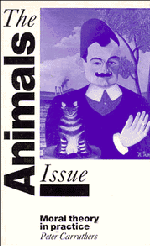Book contents
- Frontmatter
- Contents
- Preface
- 1 Moral argument and moral theory
- 2 Utilitarianism and contractualism
- 3 Utilitarianism and animal suffering
- 4 Utilitarianism and the harm of killing
- 5 Contractualism and animals
- 6 Animals and rational agency
- 7 Contractualism and character
- 8 Animals and conscious experience
- Conclusion
- Notes
- Index
1 - Moral argument and moral theory
Published online by Cambridge University Press: 03 May 2011
- Frontmatter
- Contents
- Preface
- 1 Moral argument and moral theory
- 2 Utilitarianism and contractualism
- 3 Utilitarianism and animal suffering
- 4 Utilitarianism and the harm of killing
- 5 Contractualism and animals
- 6 Animals and rational agency
- 7 Contractualism and character
- 8 Animals and conscious experience
- Conclusion
- Notes
- Index
Summary
The task of this book is to consider whether animals have moral standing – that is, whether they have rights that we may infringe by killing them or causing them suffering, or whether there is some other way in which we have direct moral duties towards them. In this first chapter I shall lay the foundation for what follows, discussing the role of theoretical considerations within morality and the methods that may be appropriate in resolving moral disputes. I shall also argue that some kinds of moral theory are too implausible to be taken seriously.
THE LIMITS OF MORALITY
It needs to be emphasised that our question about the moral standing of animals is not the same as the question whether animals matter. There are many things that matter to us which do not give rise to moral rights or duties (or at least not directly – I shall return to this point shortly). Ancient buildings, oak trees, and works of art matter greatly to many of us without, I think, having moral standing. It is hardly sensible to say that a medieval castle, the oak on the village green, or the Mona Lisa have a moral right to be preserved. Nor is it plausible to claim that we have moral duties with respect to these things – though some people may have professional duties to care for them, through their roles as museum curators or foresters.
- Type
- Chapter
- Information
- The Animals IssueMoral Theory in Practice, pp. 1 - 24Publisher: Cambridge University PressPrint publication year: 1992



